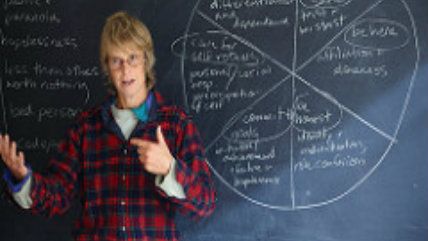Universities Lean Left, but Are Diversity Laws the Answer?
An Iowan legislator introduced a bill to require diversity of thought on college campuses in the state.


Iowa Sen. Mark Chelgren (R–Ottumwa) is a man on a mission to ensure partisan balance at universities in his state, reports The Des Moines Register. Chelgren has introduced Senate File 288, a law that would enact a hiring freeze on Iowan universities until the numbers of registered Republicans and Democrats on faculty fall within 10 percent of each other.
"We have an awful lot of taxpayer dollars that go to support these fine universities," he told the Register. Students "should be able to go to their professors, ask opinions, and they should know publicly whether that professor is a Republican or Democrat or no-party affiliation, and therefore they can expect their answers to be given in as honest a way possible. But they should have the ability to ask questions of professors of different political ideologies."
Most college faculties lean to the left, according to Heterodox Academy, an organization that aims to encourage diverse viewpoints on campus. Using data obtained by the Higher Education Research Institute (HERI), the group found that about 60 percent of professors held far-left or liberal ideologies as of 2014, while far-right and conservative professors comprise a little above 10 percent.
Writing at Heterodox Academy, Sam Abrams noted that professors have been steadily moving to the left. "Between 1995 and 2010, members of the academy went from leaning left to being almost entirely on the left," Abrams observes. "Moderates declined by nearly a quarter and conservatives decreased by nearly a third."
Chelgren sees the regulation of Iowan universities' hiring practices as the solution to this problem. "I'm under the understanding that right now they can hire people because of diversity," he said, according to the Register. "They want to have people of different thinking, different processes, different expertise. So this would fall right into category with what existing hiring practices are."
Social psychologist Jonathan Haidt, one of the men behind Heterodox Academy, spoke at the 2017 International Students for Liberty Conference last weekend. In his talk he lamented the ideological skew in higher education. Unlike the Iowa lawmaker, though, his solutions do not resort to legislation. Instead, he hopes students will press their universities "to do three things: adopt the Chicago principles on free expression, implement a non-obstruction policy—meaning you can't shut people down. You can protest, you can wave signs, but you can't stop a person from speaking. And finally, please, university, give us some viewpoint diversity."
By "the Chicago principles on free expression," he was referring to the University of Chicago philosophy that schools should offer a neutral platform for dialogue and disagreement.
Forcing schools to hire individuals based on a political quota probably wouldn't work anyway. As the Register notes, even "Chelgren said professors who want to be hired could simply change their party affiliation to be considered for the position." Colleges and universities should of course strive to incorporate a diversity of thought at their institutions, but mandating that diversity by law is not the answer.


Show Comments (54)